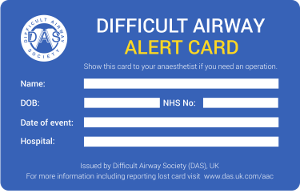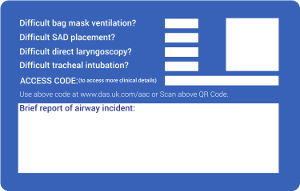The DAS Airway Alert Card and Difficult Airway Database project is a streamlined national airway alert reporting system. The patients entered on to the database also receives an alert card from DAS free of cost.
Background:
A difficult airway scenario is a rare and potentially life threatening event for the patient and also a stressful experience for the anaesthetist involved. Often this is an unanticipated situation.
After identifying a difficult airway, it is vital that anaesthetists disseminate this information to patients and their GPs. This can be life saving when patient goes on to have another operation or procedure at a later date.
Ideally critical information about a difficult airway should be recorded in such a way that it is reliably available 24/7 and should follow the patient wherever they goes for the next operation or procedure.
Purpose of the project:
Difficult Airway Society aims to address this issue by
Create an internet accessible linked-anonymised database with further detailed information about the airway episode. The database would be accessible to authorised doctors upon entering a code printed on the airway alert card or using NHS number.
Issuing an ‘Airway Alert Card’ much like a medical bracelet to patients who have had a difficult airway. Patients can carry this and present it to the anaesthetist before their next operation.
Provide a completely anonymised version of the above data for research purposes – the collected data over a period of time would be invaluable in understanding and developing safer techniques of managing patients airway.


Image of airway alert card
Overview - How will the process work?
How do I provide my patient with an airway alert card?
If you have a patient with difficult airway (anticipated or unanticipated) all you have to do is
- Decide if the information you have about the patient's airway incident will be helpful for future .
- If so download consent from DAS website and seek the consent from the patient. This is needed for information governance purposes as patient's personal and clinical information is sent outside your trust.
- Fill out an online airway alert form with details of the difficult airway incident.
- Give a copy of the summary document that can be printed at the end to the patient
- Forward the GP letter that can be printed at the end to the patient's General Practitioner
- Please do not send any documents, including the consent form, to DAS
How will DAS process this information ?
The personal identifiers you submit will be used by DAS to print and post a DAS Airway Alert Card to the patient. The personal patient identifiers will not be stored online and will be held by DAS in an offline database.
The clinical information is separated and stored in the online database.
A unique access code will be automatically generated (alphanumeric) on the DAS website and printed on the DAS Airway Alert card. This code will link the clinical information with the patient. This code can also be found on the summary document that can be printed at the end of the submission.
How can this information be accessed ?
When a patient produces this card for a future anaesthetic in any hospital in the UK the clinicians can immediatley look at the key information printed on the card.
If further information and full details of the incident are needed then the clinician can logon to the online difficult airway database and access this data with either the unique 'access code' contained in the card or with patient's NHS number.
A doctor wishing to access the database must logon to DAS website. If you are a DAS member you can log on to the website using your existing account. Others can register for free access and the process takes less than five minutes.
Where can I access the project related documents ?
Click on the following links to access the project related documents.
FAQ for Information Governance
Patient information letter and consent form
Project Leads
Dr Achuthan Sajayan Consultant Anaesthetist, University Hospitals, Birmingham
Dr Fauzia Mir Consultant Anaesthetist, St George's University Hospital, London
DAS Database creator and Technical support
Dr Karthik Ponnusamy Consultant Anaesthetist, Hamad Medical Corporation, Doha
DAS IT Co-leads
Dr Cyrus Razavi Consultant Anaesthetist, Guy's and St Thomas' NHS Foundation Trust, London
Dr Craig Johnstone Consultant Anaesthetist, Guy's and St Thomas' NHS Foundation Trust, London